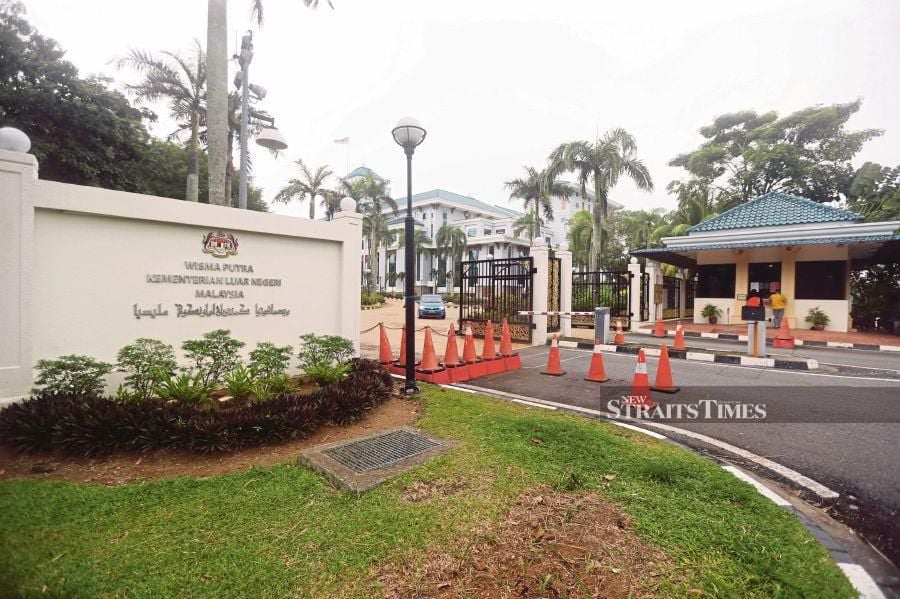IT was a particularly sad Saturday for the Foreign Ministry on that very last day of April.
As Malaysians took to the highways to return to their kampung, or otherwise made grand preparations to celebrate the end of Ramadan, Wisma Putra's many WhatsApp groups were inundated with outpourings of condolences.
The first piece of sad news came in just before midnight on Friday, April 29. Former minister Tengku Tan Sri Ahmad Rithauddeen Tengku Ismail had breathed his last just after Isyak and would be laid to rest the next morning. He was 94.
A son of the Kelantan royal household, he was a well-respected and much-loved figure within Wisma Putra, twice Foreign Minister, from 1975 to 1981, and from 1984 to 1986.
Though he was described as a "fatherly figure" by many in the ministry, at 47, Tengku Ahmad Rithauddeen was not much older than some of the senior diplomats who looked to him for guidance on matters of foreign policy.
The description was, nevertheless, apt because of his reflective nature towards the work of the ministry, as well as his guide-not-instruct approach.
Plus, by the second time Tengku Ahmad Rithauddeen came to helm the Foreign Ministry, Wisma Putra already had three years of King Ghaz's (Tun Muhammad Ghazali Shafie) bold, brash, but no less effective style of diplomacy.
Tengku Ahmad Rithauddeen was no stranger to the ministry by the time he came to helm the Foreign Ministry on Aug 13, 1975.
For five years before Tengku Ahmad Rithauddeen's appointment, Tun Abdul Razak himself was heading the ministry, wearing the double hat of prime minister and foreign minister, a tradition started by his predecessor,
Tunku Abdul Rahman, since independence.
Tengku Ahmad Rithauddeen, who had assisted Razak in his role as foreign minister, was therefore the natural choice when Razak had to relinquish his role as foreign minister.
One of the simplest yet most succinct tributes to Tengku Ahmad Rithauddeen circulated upon his death was that by Tan Sri Mohamed Jawhar Hassan, no stranger to foreign policy and Wisma Putra,—"The perfect gentleman. The perfect diplomat. We grieve."
We had barely returned home after the burial prayers for Tengku Ahmad Rithauddeen, when we were again assailed by more sad news.
This time, it was the passing of Datuk Dr Mohd Yusof Ahmad, former ambassador of Malaysia to the Islamic Republic of Iran and, perhaps more importantly, a key figure in the Institute of Diplomacy and Foreign Relations Malaysia (IDFR).
The last time I saw Yusof was in November 2021, when he attended the Royal Address of Perak's Sultan Nazrin Muizzuddin Shah in IDFR. He was so happy to "bump" into Datuk Albert S. Talala, the first director-general of IDFR, whom he had not seen in almost a decade.
There were tears in both men's eyes as they embraced each other as only long lost friends and colleagues would.
Yusof had been abroad when Albert Talala was chosen to head IDFR after his stint as ambassador to the United States ended.
However, when Yusof returned to Malaysia after his stint in Iran, he became a trainer of sorts and was placed at the National Institute of Public Administration.
This was the beginning of Yusof's life-long passion for training —apassion he was able to utilise when in 2001, he returned home from his ambassadorial post to Sweden to become the fifth director-general of IDFR.
Yusof's stint at IDFR coincided with the ministry's move to Putrajaya, where the powers that be had decided that IDFR would remain in Kuala Lumpur and take over the old ministry building.
Yusof took to overseeing the additional construction of a hostel building, lecture rooms and other features for the institute.
When he retired in 2004, IDFR had not yet moved into its new home.
Tan Sri Mohd Radzi Abdul Rahman, secretary-general of the Foreign Ministry from 2010 to 2013, who was with Yusof in the West Asia and Africa Desk, in paying tribute, described him as "a wonderful gentleman — dedicated, affable, kind-hearted, brotherly and caring… he will surely and dearly be missed".
Two men who both impacted the ministry in their own ways are no more, but they will surely live on in their legacies and in the hearts of those who knew them best. Al Fatihah.
The writer is a foreign service officer with views on international affairs



